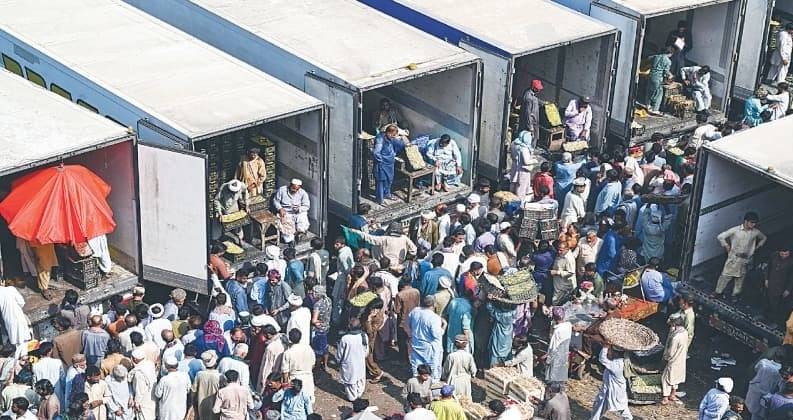
As Pakistan secured pledges of nearly $10 billion at a UN conference in Geneva on Monday, the plight of average Pakistanis continues to get worse. Not only are millions of Pakistani children at risk of waterborne diseases due to the floodwaters not having receded in four months, but the devastation of crops and hectares of farmland has also resulted in an acute shortage of basic food items. The country has experienced double-digit inflation for most of the later half of 2022, and the government was forced to import essential agricultural products that had been destroyed by the massive flooding since August 2022.
Pakistan is reportedly the 7th largest wheat producing country in the world, yielding over 25 million tons per year according to official estimates. According to local sources, the prices of wheat flour bags have skyrocketed over the past week, with many areas reporting that they have run out of any stocks to sell.
https://twitter.com/mohsin_haider_d/status/1612767512357117954
In urban areas of Punjab, a 20-kg bag of wheat flour increased dramatically from Rs. 1,800 to Rs. 3,000. In Quetta, the 20-kg bag was reportedly being sold for Rs. 3,000 as well on Tuesday. The price of roti and naan in Karachi is reportedly at Rs. 20 and Rs. 30 respectively, with many anticipating it could go even higher.
The skyrocketing prices are one part of the emerging problem; the real issue is the lack of availability, leading many poor Pakistanis to take desperate, even life-threatening measures to secure a respectable meal for their families.
https://twitter.com/SamarHBilour/status/1612388919303180290
Stampedes have been reported at multiple subsidised atta provision stations, with some scuffles also breaking out and at least one person reportedly dying in the ruckus.
https://twitter.com/DazzlinMehroz/status/1612697367903612928
Pakistan experienced devastating floods in late summer last year, which deluged large parts of the country and delivered a serious setback to the government's hopes of a quick economic recovery through policy reforms. The federal government has sought $16 billion to recover from the flood damages and restore the livelihoods of millions of flood-affected Pakistanis.
The phenomenal flooding has yet to recede in many parts, and basic services have been restored but at the bare minimum level. Millions of survivors have become refugees in their own land, and continue to be internally displaced in harsh and unforgiving winter conditions.
Pakistan is reportedly the 7th largest wheat producing country in the world, yielding over 25 million tons per year according to official estimates. According to local sources, the prices of wheat flour bags have skyrocketed over the past week, with many areas reporting that they have run out of any stocks to sell.
https://twitter.com/mohsin_haider_d/status/1612767512357117954
In urban areas of Punjab, a 20-kg bag of wheat flour increased dramatically from Rs. 1,800 to Rs. 3,000. In Quetta, the 20-kg bag was reportedly being sold for Rs. 3,000 as well on Tuesday. The price of roti and naan in Karachi is reportedly at Rs. 20 and Rs. 30 respectively, with many anticipating it could go even higher.
The skyrocketing prices are one part of the emerging problem; the real issue is the lack of availability, leading many poor Pakistanis to take desperate, even life-threatening measures to secure a respectable meal for their families.
https://twitter.com/SamarHBilour/status/1612388919303180290
Stampedes have been reported at multiple subsidised atta provision stations, with some scuffles also breaking out and at least one person reportedly dying in the ruckus.
https://twitter.com/DazzlinMehroz/status/1612697367903612928
Pakistan experienced devastating floods in late summer last year, which deluged large parts of the country and delivered a serious setback to the government's hopes of a quick economic recovery through policy reforms. The federal government has sought $16 billion to recover from the flood damages and restore the livelihoods of millions of flood-affected Pakistanis.
The phenomenal flooding has yet to recede in many parts, and basic services have been restored but at the bare minimum level. Millions of survivors have become refugees in their own land, and continue to be internally displaced in harsh and unforgiving winter conditions.

